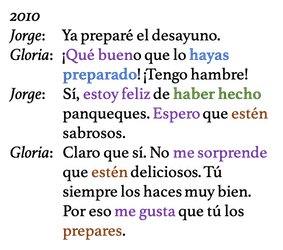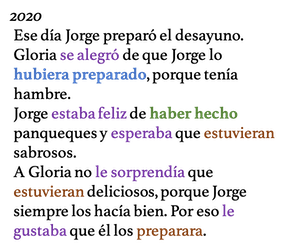63. Reacciones a hechos pasados / Reactions to Past Events (perfect subjunctive)
- Page ID
- 16267
\( \newcommand{\vecs}[1]{\overset { \scriptstyle \rightharpoonup} {\mathbf{#1}} } \)
\( \newcommand{\vecd}[1]{\overset{-\!-\!\rightharpoonup}{\vphantom{a}\smash {#1}}} \)
\( \newcommand{\dsum}{\displaystyle\sum\limits} \)
\( \newcommand{\dint}{\displaystyle\int\limits} \)
\( \newcommand{\dlim}{\displaystyle\lim\limits} \)
\( \newcommand{\id}{\mathrm{id}}\) \( \newcommand{\Span}{\mathrm{span}}\)
( \newcommand{\kernel}{\mathrm{null}\,}\) \( \newcommand{\range}{\mathrm{range}\,}\)
\( \newcommand{\RealPart}{\mathrm{Re}}\) \( \newcommand{\ImaginaryPart}{\mathrm{Im}}\)
\( \newcommand{\Argument}{\mathrm{Arg}}\) \( \newcommand{\norm}[1]{\| #1 \|}\)
\( \newcommand{\inner}[2]{\langle #1, #2 \rangle}\)
\( \newcommand{\Span}{\mathrm{span}}\)
\( \newcommand{\id}{\mathrm{id}}\)
\( \newcommand{\Span}{\mathrm{span}}\)
\( \newcommand{\kernel}{\mathrm{null}\,}\)
\( \newcommand{\range}{\mathrm{range}\,}\)
\( \newcommand{\RealPart}{\mathrm{Re}}\)
\( \newcommand{\ImaginaryPart}{\mathrm{Im}}\)
\( \newcommand{\Argument}{\mathrm{Arg}}\)
\( \newcommand{\norm}[1]{\| #1 \|}\)
\( \newcommand{\inner}[2]{\langle #1, #2 \rangle}\)
\( \newcommand{\Span}{\mathrm{span}}\) \( \newcommand{\AA}{\unicode[.8,0]{x212B}}\)
\( \newcommand{\vectorA}[1]{\vec{#1}} % arrow\)
\( \newcommand{\vectorAt}[1]{\vec{\text{#1}}} % arrow\)
\( \newcommand{\vectorB}[1]{\overset { \scriptstyle \rightharpoonup} {\mathbf{#1}} } \)
\( \newcommand{\vectorC}[1]{\textbf{#1}} \)
\( \newcommand{\vectorD}[1]{\overrightarrow{#1}} \)
\( \newcommand{\vectorDt}[1]{\overrightarrow{\text{#1}}} \)
\( \newcommand{\vectE}[1]{\overset{-\!-\!\rightharpoonup}{\vphantom{a}\smash{\mathbf {#1}}}} \)
\( \newcommand{\vecs}[1]{\overset { \scriptstyle \rightharpoonup} {\mathbf{#1}} } \)
\(\newcommand{\longvect}{\overrightarrow}\)
\( \newcommand{\vecd}[1]{\overset{-\!-\!\rightharpoonup}{\vphantom{a}\smash {#1}}} \)
\(\newcommand{\avec}{\mathbf a}\) \(\newcommand{\bvec}{\mathbf b}\) \(\newcommand{\cvec}{\mathbf c}\) \(\newcommand{\dvec}{\mathbf d}\) \(\newcommand{\dtil}{\widetilde{\mathbf d}}\) \(\newcommand{\evec}{\mathbf e}\) \(\newcommand{\fvec}{\mathbf f}\) \(\newcommand{\nvec}{\mathbf n}\) \(\newcommand{\pvec}{\mathbf p}\) \(\newcommand{\qvec}{\mathbf q}\) \(\newcommand{\svec}{\mathbf s}\) \(\newcommand{\tvec}{\mathbf t}\) \(\newcommand{\uvec}{\mathbf u}\) \(\newcommand{\vvec}{\mathbf v}\) \(\newcommand{\wvec}{\mathbf w}\) \(\newcommand{\xvec}{\mathbf x}\) \(\newcommand{\yvec}{\mathbf y}\) \(\newcommand{\zvec}{\mathbf z}\) \(\newcommand{\rvec}{\mathbf r}\) \(\newcommand{\mvec}{\mathbf m}\) \(\newcommand{\zerovec}{\mathbf 0}\) \(\newcommand{\onevec}{\mathbf 1}\) \(\newcommand{\real}{\mathbb R}\) \(\newcommand{\twovec}[2]{\left[\begin{array}{r}#1 \\ #2 \end{array}\right]}\) \(\newcommand{\ctwovec}[2]{\left[\begin{array}{c}#1 \\ #2 \end{array}\right]}\) \(\newcommand{\threevec}[3]{\left[\begin{array}{r}#1 \\ #2 \\ #3 \end{array}\right]}\) \(\newcommand{\cthreevec}[3]{\left[\begin{array}{c}#1 \\ #2 \\ #3 \end{array}\right]}\) \(\newcommand{\fourvec}[4]{\left[\begin{array}{r}#1 \\ #2 \\ #3 \\ #4 \end{array}\right]}\) \(\newcommand{\cfourvec}[4]{\left[\begin{array}{c}#1 \\ #2 \\ #3 \\ #4 \end{array}\right]}\) \(\newcommand{\fivevec}[5]{\left[\begin{array}{r}#1 \\ #2 \\ #3 \\ #4 \\ #5 \\ \end{array}\right]}\) \(\newcommand{\cfivevec}[5]{\left[\begin{array}{c}#1 \\ #2 \\ #3 \\ #4 \\ #5 \\ \end{array}\right]}\) \(\newcommand{\mattwo}[4]{\left[\begin{array}{rr}#1 \amp #2 \\ #3 \amp #4 \\ \end{array}\right]}\) \(\newcommand{\laspan}[1]{\text{Span}\{#1\}}\) \(\newcommand{\bcal}{\cal B}\) \(\newcommand{\ccal}{\cal C}\) \(\newcommand{\scal}{\cal S}\) \(\newcommand{\wcal}{\cal W}\) \(\newcommand{\ecal}{\cal E}\) \(\newcommand{\coords}[2]{\left\{#1\right\}_{#2}}\) \(\newcommand{\gray}[1]{\color{gray}{#1}}\) \(\newcommand{\lgray}[1]{\color{lightgray}{#1}}\) \(\newcommand{\rank}{\operatorname{rank}}\) \(\newcommand{\row}{\text{Row}}\) \(\newcommand{\col}{\text{Col}}\) \(\renewcommand{\row}{\text{Row}}\) \(\newcommand{\nul}{\text{Nul}}\) \(\newcommand{\var}{\text{Var}}\) \(\newcommand{\corr}{\text{corr}}\) \(\newcommand{\len}[1]{\left|#1\right|}\) \(\newcommand{\bbar}{\overline{\bvec}}\) \(\newcommand{\bhat}{\widehat{\bvec}}\) \(\newcommand{\bperp}{\bvec^\perp}\) \(\newcommand{\xhat}{\widehat{\xvec}}\) \(\newcommand{\vhat}{\widehat{\vvec}}\) \(\newcommand{\uhat}{\widehat{\uvec}}\) \(\newcommand{\what}{\widehat{\wvec}}\) \(\newcommand{\Sighat}{\widehat{\Sigma}}\) \(\newcommand{\lt}{<}\) \(\newcommand{\gt}{>}\) \(\newcommand{\amp}{&}\) \(\definecolor{fillinmathshade}{gray}{0.9}\) |
 |
 |
|
Para expresar una reacción presente (me alegra) respecto a una acción completada en el pasado (comiste), normalmente se emplea el pretérito perfecto del subjuntivo (haya + participio) en la oración subordinada. Estos son algunos ejemplos: |
To express an attitude in the present (I'm glad) toward an action completed in the past (you ate), the present perfect subjunctive (haya + past participle) is normally used in the dependent clause. Here are some examples: |
| Acción completada (en pretérito) |
Tipo | Oración principal: reacción presente Presente del indicativo |
Oración subordinada: acción comentada Pretérito perfecto del subjuntivo |
| No continuamos escribiendo. |
Duda | No pueden creer que They can't believe that |
no hayamos continuado componiendo. we didn't continue to compose. |
| ¿Disfrutaron de la película? |
Influencia | Espero que I hope |
hayan disfrutado de la película. they (have) enjoyed the movie. |
| ¿No ha llovido hoy? | Rechazo | Es falso que It's false that |
no haya llovido hoy. it hasn't rained today. |
| ¿Comiste? | Emoción | Me alegra que I am glad (that) |
hayas comido. you ate (have eaten). |
| • La oración principal expresa reacciones subjetivas de duda, influencia, rechazo o emoción (DIRE) y la acción comentada es una cláusula nominal. Con verbos que expresan influencia (deseos) y emoción, se emplea el infinitivo si hay un solo sujeto: (influencia) Para ella es importante haber estudiado. (ella) (emoción) Estoy feliz de haber terminado el proyecto. (yo) |
• The main sentence expresses subjective reactions of doubt, influence, rejection (denial) or emotion (DIRE), and the commented action is a noun clause. With verbs expressing influence (wishes) and emotion, use the infinitive if there is only one subject: (influence, desire) Her having studied is important to her. (emotion) I'm happy I finished the project. |
| Verbos y expresiones comunes que indican influencia (mandatos indirectos): |
Verbos y expresiones comunes que indican emoción (reacciones subjetivas): |
| aconsejar que..., esperar, evitar, exigir, hacer, lograr, mandar, preferir, prohibir, recomendar, sugerir... |
alegrar, interesar, enojar, gustar, importar, lamentar, molestar, sorprender, tener miedo de que... |
| es esencial que, es importante que, es mejor que, es necesario que, es urgente que, es deseable que... |
parecer raro/bonito/interesante/fascinante que... ser bueno/natural/increíble/magnífico/una lástima que... |
| • En general, las expresiones que indican convicción o certeza están seguidas del indicativo, y las que indican duda o falta de convicción, del subjuntivo: Es cierto que ha llovido. vs. Es falso que haya llovido. Creo que llovió. vs. No creo que haya llovido. Saben que he estudiado. vs. Dudan que haya estudiado. En las preguntas con este tipo de expresiones, el subjuntivo es opcional, según el nivel de duda en la mente de quien habla: ¿Crees que ha llovido? ≈ ¿Crees que haya llovido? |
• In general, expressions of belief or certainty are not followed by the subjunctive, while those indicating disbelief or uncertainty, are: It's true that it has rained. vs. It's false that it has rained. I think it rained. vs. I don't think it rained. They know I've studied. vs. They doubt I've studied. In questions, the clause may or may not involve a subjunctive, depending on the doubt in the mind of the speaker. Do you think it has rained? ≈ Do you think it might have rained? |
| • Si la reacción presente se refiere a hechos habituales, acciones en progreso o descripciones (imperfectas), puede emplearse el pretérito imperfecto del subjuntivo en la oración subordinada: | • When a present attitude refers to things that used to happen, actions in progress, or descriptions (imperfect), the [imperfect] simple Past Subjunctive may be used in the dependent clause. |
| Acción imperfecta (no completada) |
Oración principal: reacción presente Presente del indicativo |
Oración subordinada: acción comentada Pretérito perfecto o imperfecto del subjuntivo |
| Colón viajaba mucho (hecho habitual) |
No es sorprendente que It is not surprising that |
Colón viajara [haya viajado] tanto. Columbus used to travel [traveled] so much. |
| ¿Nunca llovía? (hecho habitual) |
(Es una) lástima que It's a pity that |
nunca lloviera. it never rained (used to rain). |
| Estábamos durmiendo. (acción en progreso) |
No pueden creer que They can't believe that |
estuviéramos [hayamos estado] durmiendo ese día. we didn't continue to compose. |
| ¿Hacía sol? (descripción) |
Es curioso que It's curious that |
hiciera [haya hecho] sol en medio de semejante aguacero. it was sunny in the middle of such a rain shower. |
| • Para referirse a una reacción pasada (me alegró) ante una acción completada antes (comiste), normalmente se emplea el pluscuamperfecto del subjuntivo (hubiera + participio) en la oración subordinada: Me alegró que hubieras comido. Nos pareció raro que no hubieran llegado. Estaba sorprendida de que yo me hubiera atrevido. Pero se emplean el infinitivo y el indicativo en los casos mencionados arriba: Me alegré de haber comido. (el mismo sujeto: yo) Creí que habían comido. (convicción o certeza) Y puede emplearse el pretérito imperfecto del subjuntivo para hechos habituales, acciones en progreso o descripciones (imperfectas): No era sorprendente que Colón viajara con frecuencia. (hábito) Nos encantó que hiciera [hubiera hecho] sol ese día. (descripción) |
• To refer to a past reaction (I was glad/got happy) toward an action previously completed (you ate), the pluperfect subjunctive (hubiera + past participle) is normally used in the dependent clause: We were glad you had eaten. It seemed strange to us that they hadn't arrived. She was surprised that I had dared. But use the infinitive and the indicative in the cases mentioned above: I was glad I had eaten. (same subject: I) I thought they had eaten. (conviction or certainty) And the [imperfect] simple Past Subjunctive may be used for things that used to happen, actions in progress, or descriptions (imperfect): It was not surprising that Columbus traveled so much. (habit) We loved that it was / had been sunny that day. (description) |
¡A practicar!
Complete con la forma adecuada del verbo haber. [Ejercicio interactivo] (Diccionario)
Modelo: ¿Terminaste el informe? Me parece magnífico que lo hayas terminado.
1. ¿Llegaste a tiempo? Me alegra que __________ llegado a tiempo.
2. El Papa visitó nuestro país. Estamos felices de que nos __________ visitado.
3. ¡Ayer por fin me llamaron! Me gusta mucho que me __________ llamado.
4. Terminamos antes que ustedes. ¿Les sorprende que __________ terminado antes que ustedes?
5. María dijo eso. No puedo creer que María __________ dicho eso.
6. No sé si vamos a terminar para el lunes. Es urgente que __________ terminado para el lunes.
7. Dicen que no tuvieron tiempo. No me importa que no __________ tenido tiempo.
- Traducción al inglés
- 1) I'm glad you arrived on time. 2) We're happy that the Pope visited our country. 3) I love (the fact) that they called me. 4) Are you surprised that we finished before you? 5) I can't believe María said that. 6) It's urgent that we have finished by Monday. 7) I don't care that they didn't have the time.
- Respuestas
- 1) hayas 2) haya 3) hayan 4) hayamos 5) haya 6) hayamos 7) hayan
Cambie al pasado las reacciones presentes. [Ejercicio interactivo] (Diccionario)
Modelos: Me parece magnífico que hayas terminado el informe. → Me pareció magnífico que hubieras terminado el informe.
Es raro que Juan no haya llamado. → Era raro que Juan no hubiera llamado.
1. Me alegra que hayas llegado a tiempo. → Ayer me __________ que ___________ llegado a tiempo.
2. Estamos felices de que el Papa haya visitado nuestro país. → __________ felices de que el Papa ___________ visitado nuestro país.
3. Ayer no me llamaron. → Ojalá que me __________ llamado ayer.
4. ¿Te sorprende que yo haya terminado antes que tú? → ¿Ayer te __________ que yo ___________ terminado antes que tú?
5. No puedo creer que María haya dicho eso. → No __________ creer que María ___________ dicho eso.
6. Es urgente que hayamos terminado para el lunes. → __________ urgente que ___________ terminado para ese lunes.
7. No me importa que no hayan tenido tiempo. → No me __________ que no ___________ tenido tiempo.
- Traducción al inglés
- 1) I'm glad you arrived on time. 2) We're happy that the Pope visited our country. 3) They didn't call me; I wish they had. 4) Are you surprised that I finished before you? 5) I can't believe María said that. 6) It's urgent that we have finished by Monday. 7) I don't care that they didn't have the time.
- Respuestas
- 1) alegré / hubieras 2) Estábamos / hubiera 3) hubieran 4) sorprendió / hubiera 5) podía / hubiera 6) Era / hubiéramos 7) importaba - importó / hubieran


